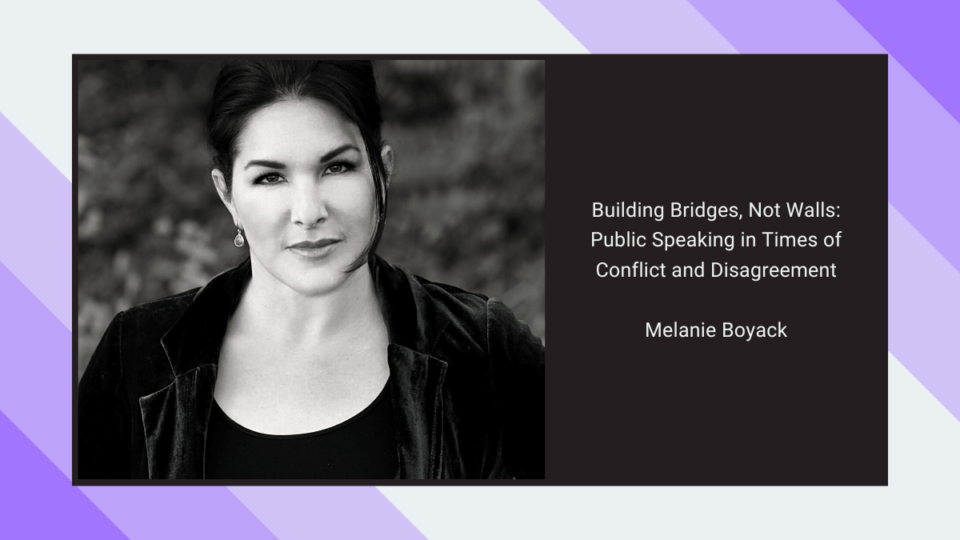Leaders play a crucial role in fostering understanding and reconciliation in a world where conflict is prevalent. Empathy is a powerful tool that leaders can use to achieve these goals, especially when it is communicated effectively through speeches. In this article, we explore the impact of words in conflict situations. We also examine how leaders can cultivate empathy and employ effective communication strategies to build bridges instead of walls. Our insights are based on the work of Melanie Boyack, a retired trauma therapist with significant experience addressing PTSD, addiction, depression, and anxiety. Leaders can create a more connected and empathetic world by harnessing empathy in their speeches.
The Power of Empathetic Communication
Empathy, at its core, is the ability to understand and share the feelings of another. In the context of leadership, it involves recognizing the emotions of those you lead and communicating in a way that acknowledges those feelings and perspectives. When leaders use empathetic communication in their speeches, they validate their audience’s experiences and bridge the gap between differing viewpoints, creating a foundation for mutual respect and understanding.
Why Empathy Matters in Public Speaking
Empathy in public speeches serves several critical functions. It helps in:
- Building Trust: When leaders demonstrate empathy, they show their audience they are seen, heard, and valued. This builds trust, a crucial element in any relationship, essential in leadership dynamics.
- Resolving Conflicts: Empathetic communication acknowledges the emotions involved in conflicts, making it possible to address the underlying issues rather than just the symptoms. This approach can lead to more sustainable solutions.
- Encouraging Collaboration: By fostering an environment of understanding and mutual respect, empathy makes it easier for individuals and groups with diverse viewpoints to work together towards common goals.
Melanie Boyack’s extensive experience in treating individuals with trauma and her work with various teams across Utah, including military units and emergency responders, underscores the significance of empathy in addressing and resolving conflicts. Her ability to engage diverse audiences on topics related to trauma, couples therapy, and addiction highlights the importance of empathetic communication in healing and collaboration.
Strategies for Incorporating Empathy into Public Speeches
Drawing on Melanie Boyack’s expertise, leaders can employ several strategies to infuse empathy into their public speeches, enhancing their effectiveness in conflict resolution and community building.
Understand Your Audience
The first step towards empathetic communication is understanding your audience’s perspective. This involves researching their backgrounds, experiences, and the challenges they face. Leaders can use this information to tailor their messages in a way that resonates with their audience on a personal level.
Use Inclusive Language
Inclusive language acknowledges diversity and shows respect for all audience members. It avoids assumptions and generalizations, instead focusing on language that includes and unites. This approach demonstrates a leader’s commitment to valuing each individual’s experience.
Share Personal Stories
Personal stories can serve as powerful tools for illustrating empathy. By sharing their own experiences or those of others, leaders can connect with their audience emotionally, making abstract concepts more tangible and relatable.
Listen and Respond to Feedback
Empathetic communication is a two-way street. Leaders should not only speak but also listen to the responses of their audience. This can involve direct interaction during the speech or soliciting feedback afterward. Leaders reinforce the importance of empathy in their communication by showing that they value and consider their audience’s perspectives.
Highlight Common Values and Goals
Focusing on shared values and goals helps bridge divides and foster a sense of unity. Leaders can use their speeches to highlight shared aspirations, reminding their audience of the bigger picture and the benefits of working together.
The Impact of Empathy on Leadership
The application of empathy in public speeches can have a transformative impact on leaders and their audiences alike. It facilitates deeper connections, promotes healing, and encourages collaborative efforts towards common objectives. Melanie Boyack’s work with various teams and individuals, particularly in high-stress environments, illustrates the power of empathetic communication in creating positive change.
Empathy allows leaders to navigate complex and sensitive issues with grace and compassion, leading by example and inspiring others to adopt a more understanding and collaborative approach to conflict resolution. In doing so, leaders can contribute to building a more empathetic society where individuals are motivated to understand each other and work together for the greater good.
Conclusion
The role of empathy in public speeches, especially in the context of leadership and conflict resolution, cannot be overstated. By understanding the impact of words, cultivating compassion, and employing effective communication strategies, leaders can contribute significantly to building bridges instead of walls. Melanie Boyack’s trauma therapy expertise and ability to engage diverse audiences on sensitive topics underscore the importance of empathetic communication. As leaders incorporate these strategies into their public speeches, they not only enhance their effectiveness in resolving conflicts but also foster a culture of understanding and collaboration that is essential for addressing the complex challenges of our time.

